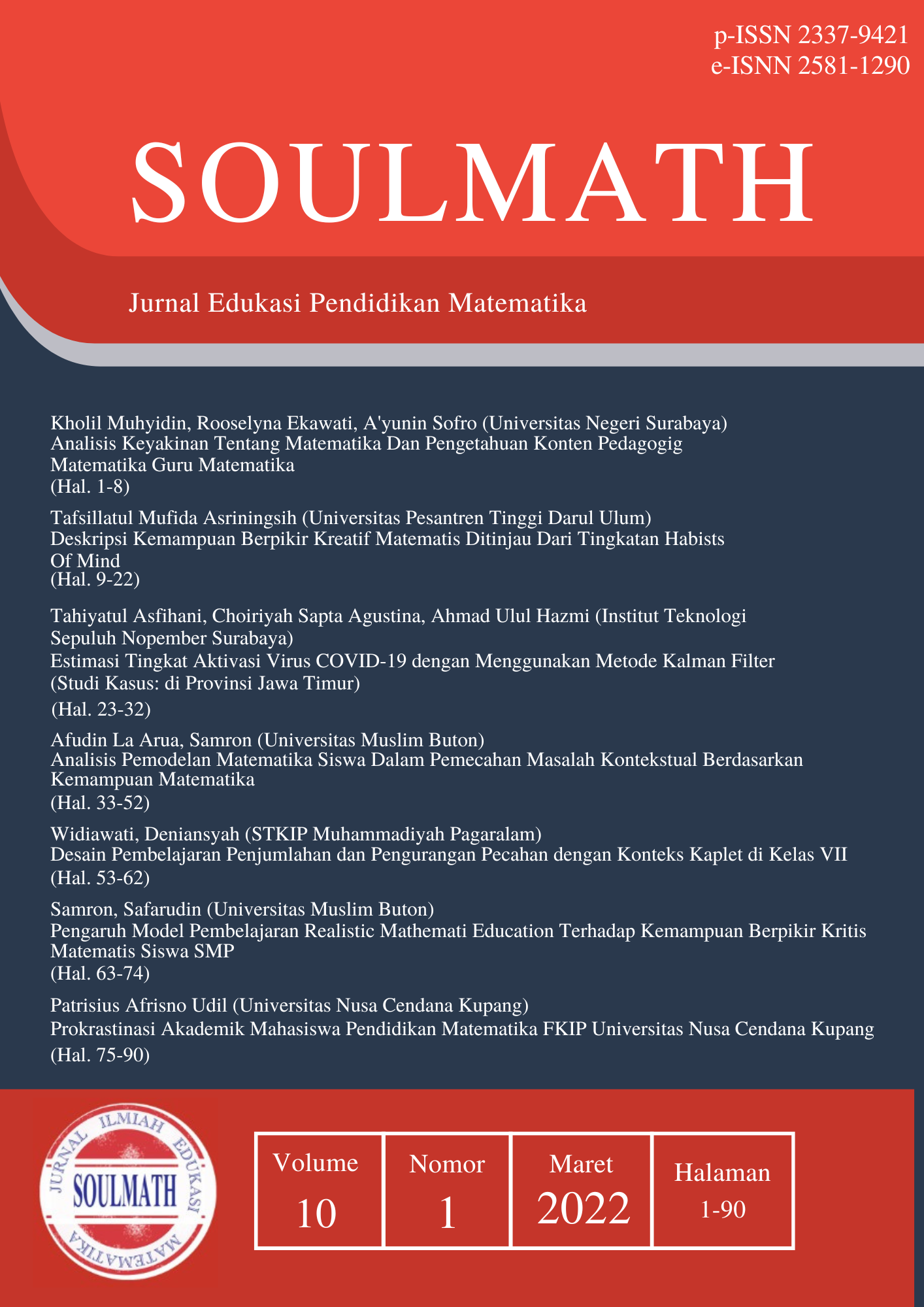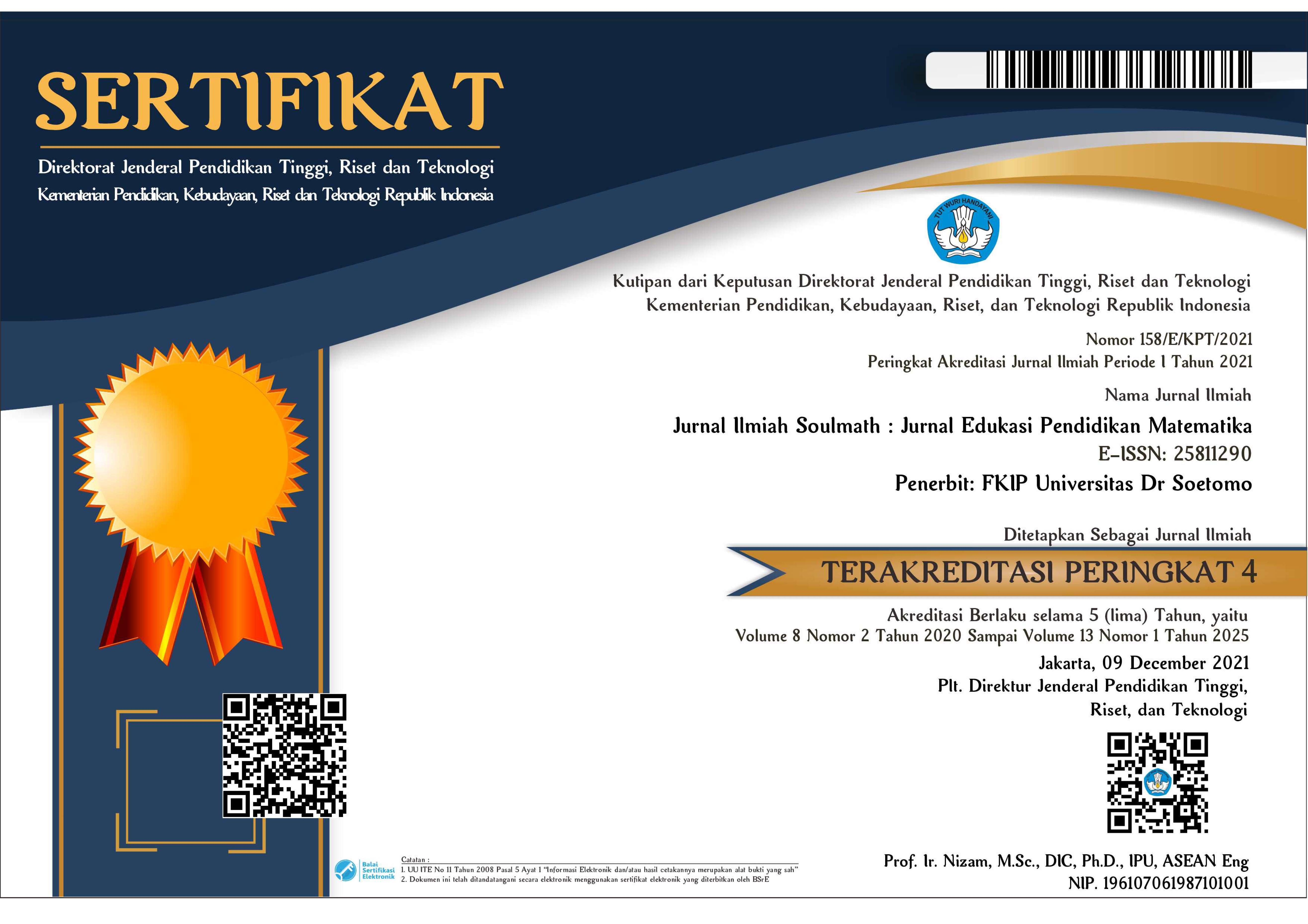Prokrastinasi Akademik Mahasiswa Pendidikan Matematika FKIP Universitas Nusa Cendana Kupang
 Abstract views: 318
,
Abstract views: 318
,
 4520 Publish (Bahasa Indonesia) downloads: 248
4520 Publish (Bahasa Indonesia) downloads: 248
Abstract
This research aims to describe the academic procrastination of mathematics education students at FKIP Undana. It includes scores and categories of academic procrastination both generally and based on its indicators. The method used is descriptive quantitative. The population were all students of Mathematics Education Study Program FKIP Undana (N = 423) with sample of 266 students who were selected by simple random sampling. The instrument used is the Student Academic Procrastination Scale. The results showed that generally the academic procrastination of mathematics education students was identified in the moderate category with percentage of 47.37% and average score of 45.55. The percentage of students who experience academic procrastination in the high category is 19.17% and very high is 7.52%. The results also found that most of the students' academic procrastination was identified in the moderate category for 4 indicators, namely time management (37.59%), intention-action gap (41.73%), perceived-ability (60.53%), and social disturbance (50.00%). Furthermore, it is found that more than 20% students were identified to experience academic procrastination in high and very high category for the four indicators. On the indicator of emotional distress, most of the students had academic procrastination in the very high (5.26%), high (35.34%), and moderate (20.68%) category.
Keywords: procrastination, academic procrastination, mathematics edication
Downloads
References
[2] S. Inganah and Zukhrufurrohmah, “Peningkatan Hasil Belajar Mahasiswa Melalui Guided Discovery Learning Pada Matakuliah Aljabar Linier,” EDU-MAT J. Pendidik. Mat., vol. 8, no. 1, pp. 39–45, 2020, doi: 10.20527/edumat.v8i1.7496.
[3] S. Febritama and E. L. Sanjaya, “HUBUNGAN ANTARA REGULASI DIRI DENGAN PERILAKU PROKASTINASI AKADEMIK PADA MAHASISWA,” J. Ecopsy, vol. 5, no. 2, 2018, doi: 10.20527/ecopsy.v5i2.5178.
[4] A. Saman, “Investigating Procrastination in Higher Education,” vol. 149, no. Icest, pp. 181–183, 2017, doi: 10.2991/icest-17.2017.60.
[5] J. J. R. Fanggidae, C. K. Ekowati, J. M. H. Nenohai, and P. A. Udil, “Klasifikasi faktor-faktor yang mempengaruhi prestasi akademik mahasiswa pendidikan matematika FKIP UNDANA dengan metode CHAID,” Fraktal J. Mat. dan Pendidik. Mat., vol. 2, no. 1, pp. 23–33, 2021.
[6] S. Muyana, “Prokrastinasi akademik dikalangan mahasiswa program studi bimbingan dan konseling,” Couns. J. Bimbing. dan Konseling, vol. 8, no. 1, p. 45, 2018, doi: 10.25273/counsellia.v8i1.1868.
[7] E. A. Surijah and S. Tjundjing, “Mahasiswa Versus Tugas: Prokrastinasi Akademik dan Conscientiousness,” Indones. Psychol. J., vol. 22, no. 4, pp. 352–374, 2007.
[8] K. Tani, “Academic procrastination and the effect on students’ results for ICT students,” Int. J. Cyber Behav. Psychol. Learn., vol. 7, no. 2, pp. 31–35, 2017, doi: 10.4018/IJCBPL.2017040103.
[9] E. H. ÖZBERK and T. TÜRK KURTÇA, “Profiles of Academic Procrastination in Higher Education: A Cross-Cultural Study Using Latent Profile Analysis,” Int. J. Psychol. Educ. Stud., vol. 8, no. 3, pp. 150–160, 2021, doi: 10.52380/ijpes.2021.8.3.465.
[10] P. Steel, “The nature of procrastination: A meta-analytic and theoretical review of quintessential self-regulatory failure,” Psychol. Bull., vol. 133, no. 1, pp. 65–94, 2007, doi: 10.1037/0033-2909.133.1.65.
[11] G. Schraw, T. Wadkins, and L. Olafson, “Doing the things we do: A grounded theory of academic procrastination,” J. Educ. Psychol., vol. 99, no. 1, pp. 12–25, 2007, doi: 10.1037/0022-0663.99.1.12.
[12] M. B. Yilmaz, “The Relation between Academic Procrastination of University Students and Their Assignment and Exam Performances: The Situation in Distance and Face-to-Face Learning Environments,” J. Educ. Train. Stud., vol. 5, no. 9, p. 146, 2017, doi: 10.11114/jets.v5i9.2545.
[13] M. M. Wirajaya, N. N. Padmadewi, and D. P. Ramendra, “Investigating the Academic Procrastination of Efl Students,” J. Pendidik. Bhs. Ingg. Indones., vol. 8, no. 2, pp. 67–77, 2020, doi: 10.23887/jpbi.v8i2.3498.
[14] K. E. Lestari and M. R. Yudhanegara, Penelitian Pendidikan Matematika. Bandung: Refika Aditama, 2018.
[15] A. R. Agustin and W. Winarso, “Profile of Student Academic Procrastination Behavior in Problem Solving and Mathematical Digital Literacy,” J. Didakt. Mat., vol. 4185, pp. 190–207, 2021, doi: 10.24815/jdm.v8i2.21367.
[16] Triyono and M. E. Rifai, Efikasi Diri dan Regulasi Emosi dalam Mengatasi Prokrastinasi Akademik. Sukoharjo: CV. Sindunata, 2019.
[17] D. H. Rahman, “The Development and Validation of the Thesis-Writing Procrastination Scale,” 2019, vol. 3, pp. 65–70, doi: 10.32698/hum0197.
[18] D. S. Ackerman and B. L. Gross, “My instructor made me do it: Task characteristics of procrastination,” J. Mark. Educ., vol. 27, no. 1, pp. 5–13, 2005, doi: 10.1177/0273475304273842.
[19] J. D. McCloskey, “FINALLY, MY THESIS ON ACADEMIC PROCRASTINATION,” TESIS, 2011.
[20] J. R. Ferrari and J. L. Johnson, Procrastination and Task Avoidance: Theory, Research and Treatment. New York: New York: Plenum Press, 1995.
[21] E. Safa’ati, M. I. Halim, and Z. Illiyati, “Peran Regulasi Diri dan Konformitas Teman Sebaya dengan Prokrastinasi Akademik Mahasiswa Universitas Muria Kudus,” in Prosiding Konferensi Nasional Peneliti Muda Psikologi Indonesia, 2017, pp. 75–84.
[22] J. B. Burka and L. M. Yuen, Procrastination: Why You Do It, What To Do About It. Cambridge, MA: Da Capo Press, 2008.
[23] Yudistiro, “Hubungan Prokrastinasi Akademik dengan Prestasi Belajar Pada Siswa yang Aktif dalam Kegiatan Ekstrakurikuler,” Psikoborneo, vol. 4, no. 2, pp. 305–309, 2016.
[24] Budiyono, Pengantar Penilaian Hasil Belajar. Surakarta: UNS Press, 2016.
[25] Q. G. Jiao, G. A. DaRos-Voseles, K. M. T. Collins, and A. J. Onwuegbuzie, “Academic procrastination and the performance of graduate-level cooperative groups in research methods courses,” J. Scholarsh. Teach. Learn., vol. 11, no. 1, pp. 119–138, 2011, [Online]. Available: http://anitacrawley.net/Resources/Articles/JiaoPerformance.pdf.







